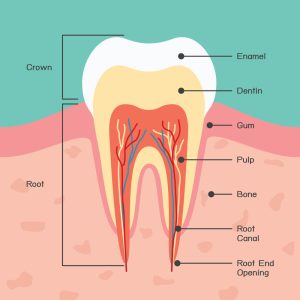If you have teeth sensitive to heat and feel you can’t enjoy your favorite hot food or drinks anymore, don’t panic. Many people experience sensitive teeth, but there are steps you can take to help prevent them and even treat them. So, what causes your teeth to be sensitive to heat, and what can you do about it?
This article will answer the following questions so that you can savor that first sip of coffee (or tea) without worrying about pain:
- What are sensitive teeth?
- What causes my teeth to be sensitive to heat?
- What can I do to prevent sensitivity to heat?
- Are there treatments for tooth sensitivity to heat?
If you want to know what causes teeth sensitivity to heat — and a few ways to prevent it and even help treat it, keep reading to learn more.
Let’s dive right in and start with sensitive teeth are their causes.
In This Article
What are sensitive teeth?
If you get a small twinge or sharp pain in one or more of your teeth when you drink a hot beverage, you may have a tooth sensitive to hot food and drinks. Teeth sensitivity is generally triggered by something that irritates the sensitive dentin layer beneath your enamel by delivering hot or cold triggers through tooth tubules.
Triggers can include:
- Cold and hot food or drinks
- Breathing in cold air
- Acidic or sugary food or drinks
- Teeth whitening treatments
- Some kinds of toothpaste and mouthwash (strong minty flavors)
Having sensitive teeth can mean anything from having pain or discomfort in just one tooth or many, it can be a short sharp pain or a dull ache that lasts for weeks.
If your pain or discomfort is severe or lasts weeks on end, then it is advisable to see your dentist so they can make sure you don’t have any underlying issues that need addressing.
What causes my teeth to be sensitive to heat?
Now that you know what triggers sensitive teeth let’s discuss how these triggers can get close enough to the sensitive nerves beneath your enamel to cause you pain and discomfort. Not everyone has sensitive teeth, so what causes teeth to be sensitive to heat?
Generally, sensitive teeth are caused by thinning or damaged enamel, exposed tooth roots, or dental work. This is because your enamel (the top layer of your teeth) protects the sensitive dentin layer below.
When your enamel is compromised, it allows potential sensitivity triggers to reach the dentin layer. Tooth decay is one of the main culprits because it weakens the enamel and causes cavities to form.

Cavities are essentially a hole in the top layer of your tooth that leads straight to the dentin layer below. Now, if you imagine drinking a hot cup of coffee, that heat is going to feel a lot hotter where that cavity is allowing access to the sensitive area.
There are other causes of tooth sensitivity, but they all result in a sensitive part of your teeth being more exposed than a tooth with strong enamel and healthy gums. Some of these causes include:
- Pregnancy hormones
- Gum recession
- Dental fillings
- Teeth whitening treatments
- Dental work like veneers
- Teeth grinding
- Brushing too hard
- Consuming acidic foods (enamel erosion)
Sometimes you may have a sensitive tooth or teeth directly after dental work, which may be temporary while you recover. If it does not get better, it’s best to consult your dentist for advice.
What can I do to prevent sensitivity to heat?
If you have a tooth sensitive to hot and cold but still want to enjoy coffee in the morning or ice cream on a sunny day, there are a few things you can do. The most essential and simple step you can take is to ensure that you have a good oral hygiene routine. This includes brushing and flossing your teeth the recommended twice per day.

Other steps you can take to prevent teeth sensitivity include rinsing your mouth out after eating or drinking anything acidic or sugary because these substances can lead to enamel erosion. Make sure you have a sensitive toothbrush with soft bristles and that you are not brushing with too much pressure. An electric toothbrush with a pressure sensor can help you know how long to brush and how much pressure to use.
You can also use products designed to help with sensitivity and those that help remineralize and strengthen your enamel.
Are there treatments for tooth sensitivity to heat?
If you have a good oral hygiene routine and have tried all the methods available, the over-the-counter to help teeth sensitive to heat and still feel that you need more help, you can consult your dentist. Maybe you have an underlying issue that needs treating professionally, such as getting a filling or tooth restoration, such as a crown.
There are also professional dental treatments and products to help with sensitive teeth, depending on what’s causing it. These include:
- Root canal treatment (for extreme cavities or decay)
- Gum grafts (when receding gums are causing your sensitivity)
- Fluoride varnish
- A crown, inlay, or bonding
- Prescription fluoride toothpaste

Conclusion
If you have a tooth sensitive to cold and hot drinks, or a tooth sensitive to air, and want to enjoy them without pain or discomfort, don’t worry! There are steps you can take to lessen the impact that sensitive teeth have on your life.
If you have tried and tested multiple products designed to help with teeth that are sensitive to heat with no luck, then it may be time to consult your dentist to see if there are further steps to take.
FAQ’s
Why is my crowned tooth sensitive to heat?
If you have a crowned tooth sensitive to heat, it may be because your gums have receded over time and the tooth root is exposed. Trapped tooth decay below the crown can be another reason. Speak to your dentist if you have concerns about your crowned teeth.
Jada.ada.org: Symptoms of Sensitive Teeth. Consulted 27th December 2022.




